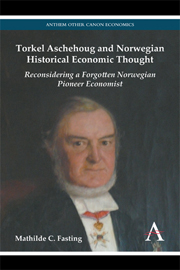 Torkel Aschehoug and Norwegian Historical Economic Thought
Torkel Aschehoug and Norwegian Historical Economic Thought Book contents
- Frontmatter
- Contents
- Acknowledgements
- Chapter 1 Introduction
- Chapter 2 Biography
- Chapter 3 Norwegian Economic and Political Context in the Nineteenth Century
- Chapter 4 Norwegian Economic Thought and Method
- Chapter 5 Development of the Economic Thought of Aschehoug: Statsøkonomisk Forening and the Socialøkonomik Project
- Chapter 6 The German Historical School: Similarities, Influences and Discrepancies
- Chapter 7 Alfred Marshall: Aschehoug and the Adoption of Marginal Theory
- Chapter 8 The French Influence: Adopting Say and Refuting Socialism
- Chapter 9 Views of Labour in the Work of Aschehoug
- Chapter 10 The Entrepreneur: The Fourth Production Factor
- Chapter 11 Trade and Customs Debates from 1840 to 1906
- Chapter 12 The Theory of Economic Crises
- Chapter 13 The Legacy of Aschehoug: Concluding Remarks
- Appendix A Other Norwegian Turn-of-the-Century Economists
- Appendix B Drafts for Socialøkonomik
- Appendix C Detailed Contents of Socialøkonomik (First Editions from 1903 to 1908)
- Notes
- Literature
- Index
Chapter 11 - Trade and Customs Debates from 1840 to 1906
Published online by Cambridge University Press: 05 March 2014
- Frontmatter
- Contents
- Acknowledgements
- Chapter 1 Introduction
- Chapter 2 Biography
- Chapter 3 Norwegian Economic and Political Context in the Nineteenth Century
- Chapter 4 Norwegian Economic Thought and Method
- Chapter 5 Development of the Economic Thought of Aschehoug: Statsøkonomisk Forening and the Socialøkonomik Project
- Chapter 6 The German Historical School: Similarities, Influences and Discrepancies
- Chapter 7 Alfred Marshall: Aschehoug and the Adoption of Marginal Theory
- Chapter 8 The French Influence: Adopting Say and Refuting Socialism
- Chapter 9 Views of Labour in the Work of Aschehoug
- Chapter 10 The Entrepreneur: The Fourth Production Factor
- Chapter 11 Trade and Customs Debates from 1840 to 1906
- Chapter 12 The Theory of Economic Crises
- Chapter 13 The Legacy of Aschehoug: Concluding Remarks
- Appendix A Other Norwegian Turn-of-the-Century Economists
- Appendix B Drafts for Socialøkonomik
- Appendix C Detailed Contents of Socialøkonomik (First Editions from 1903 to 1908)
- Notes
- Literature
- Index
Summary
In Chapter 3, the Norwegian economic and political context in the nineteenth century was examined, and the main protagonist, Schweigaard, was presented. This chapter looks at the different trade and customs debates, focusing on those which followed Schweigaard's death in 1870. Aschehoug was central to many of them, as were his colleagues at the university, Hertzberg and Morgenstierne. The intention is to relate these debates to Aschehoug's final statements on trade and trade policies in Socialøkonomik. The conclusion that can be drawn is that Aschehoug and his fellow scholars believed in the principles of free trade, just as Schweigaard had before them. They were nevertheless concerned about the international protectionist development, especially from the 1870s onwards. And at the turn of the century, they felt compelled to admit that protectionist measures were needed in order to ‘meet the international trade regimes’. Their main argument in favour of free trade was that, for a small open economy like that of Norway, free trade was of paramount importance for economic growth. But again, the debates show that pragmatic decisions were made, and above all, trade and customs were a general concern of the state and should not be left laissez-faire, but as the saying further goes, ‘laissez-passer les marchandises’ (‘let the merchandise pass’ – the origin is pointed out in Chapter 8).
The debates do not imply that the Norwegian economists were adherents of laissez-faire. As should be remembered from the summary of Schweigaard, laissez-faire was never accepted wholeheartedly in Norway.
- Type
- Chapter
- Information
- Torkel Aschehoug and Norwegian Historical Economic ThoughtReconsidering a Forgotten Norwegian Pioneer Economist, pp. 165 - 176Publisher: Anthem PressPrint publication year: 2013


